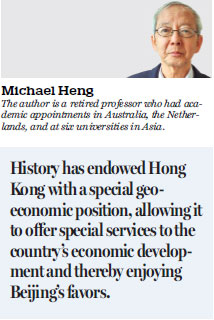Continuing relevance of HK to the country
Updated: 2017-02-06 07:25
By Michael Heng(HK Edition)
|
|||||||||
Michael Heng writes that to maintain its special aura and international flavor, the SAR must leverage its social, cultural and business resources to serve the needs of the mainland
The can-do spirit of the Hong Kong people, their resourcefulness and hard work have turned a tiny dot on earth into one of the most innovative, exciting and prosperous cities of the world. It has been able to do this by serving the needs of the region in which it is situated. The city is likely to continue doing so in the future if it can leverage its social, cultural and business resources to serve the needs of the mainland.
Before Deng Xiaoping introduced economic reform in 1978, Hong Kong was the only truly international port available to China in its dealings with the outside world. The entrepot trade fueled the growth of the city's financial sector and other auxiliary services.

After the historic decision of reform and opening-up of the country in 1978, Hong Kong became the conduit for inflow of investment, technology, and business contacts, including adventurous business people among the overseas Chinese. Hong Kong took on this additional role seamlessly, and was bountifully rewarded for it. It was soon to enjoy the sobriquet of one of the four little dragons, bestowing on it the enviable reputation of being an economic miracle and a darling of the World Bank.
The ways Beijing and London handled the issue of Hong Kong from 1949 till mid-1979 provide useful lessons for students of statecraft and diplomacy. Mutual benefits and pragmatism, rather than commitment to ideological purity, drove the decision-making on both sides.
On the question of the return of Hong Kong's sovereignty to China, the central government was shrewd enough to draw on the experience of the long history of China to come up with the formula of "One Country, Two Systems".
Soon after Hong Kong's return to the motherland in mid-1997, East Asia experienced the Asian financial crisis. It was an occasion for Beijing to demonstrate its firm commitment to the prosperity of Hong Kong. Mainland tourists arrived in large numbers to boost the depressed economy. With the solid backing of the mainland's massive economy, Hong Kong fended off the attacks of currency speculators. When the buffeting gales of the financial crisis finally died down, it even made money from the miscalculations of the speculators.
Another milestone in Hong Kong's evolution came after China became a member of the World Trade Organization in December 2001. Though Hong Kong still serves as a conduit to deal with the outside world, this role is being shared by other major Chinese cities which are gradually upgrading themselves to be more like Hong Kong.
History has endowed Hong Kong with a special geo-economic position, allowing it to offer special services to the country's economic development and thereby enjoying Beijing's favors. This advantage is diminishing over time and the city needs to prepare itself to face the future by continuing to be relevant to the country.
There are a few areas where Hong Kong is well placed to serve the needs of the mainland. Here we shall touch on two:
The first is attracting talents from overseas. Beijing has identified talent as a critical success factor in its economic development. Since its opening-up, China has experienced a brain drain, with many of its brightest students remaining abroad after their university education. To reduce the flow, and better still to reverse the flow, the central government has launched a program to attract foreign talents, with a focus on recruiting its own citizens who have studied and worked abroad. The program has not been very successful. China has not been able to lure big numbers of talents who are willing to work on the mainland. The reasons can range from poor air and water quality, to work environment, to children's education, to social life. In other words, the mainland's deficiency in this respect may prove to be a bonus for Hong Kong as its sophisticated lifestyle, work environment, multiculturalism, social conditions, healthcare and education are clearly more acceptable to foreign professionals and investors. Expatriates who feel like fish out of water on the mainland may find Hong Kong a more agreeable alternative for them to work and live in.
The second is to act as a channel to introduce to an international audience the vast treasures of China's cultural achievements. In this respect, the coming Hong Kong Palace Museum will prove to be a godsend. Having been a global metropolis for a long time, with a multicultural population with international tastes, Hong Kong has enviable cultural-intellectual resources to package the rich cultural products of China in ways that can be better understood and appreciated by outsiders. Such appreciation of China's cultures not only enhances China's international image but also Hong Kong's own attractiveness. Its positive effect on commerce and mutual understanding cannot be underestimated.
(HK Edition 02/06/2017 page8)